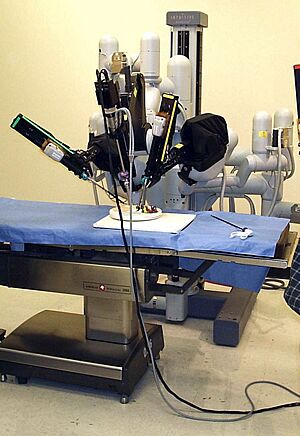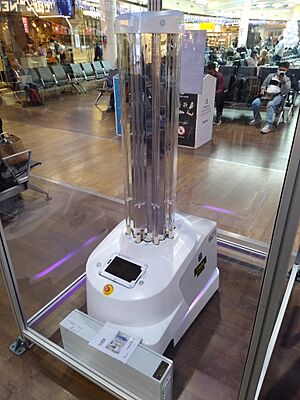Medical robot facts for kids
A medical robot is a special kind of robot used to help doctors and nurses in healthcare. A medical robot is a special kind of robot designed to help doctors, nurses, and patients in many ways, from performing delicate surgeries to delivering medicines and even keeping people company. One common type is the surgical robot, which can be controlled by a surgeon to perform delicate procedures.
Contents
Types of Medical Robots
Medical robots come in many shapes and sizes, each with a special job to do. Here are some of the most important types:
Surgical Robots
- What they are: These are perhaps the most famous medical robots. Surgical robots are like super-skilled assistants for surgeons. They don't do the surgery all by themselves, but they help the human surgeon perform operations with incredible accuracy and steadiness.
- How they work: Think of it like a super-advanced video game controller. The surgeon sits at a special console, looking at a 3D screen that shows a magnified view inside the patient's body. They use special hand controls, and the robot's tiny "arms" inside the patient's body copy their movements. These robot arms can move in ways human hands can't, making very small, precise cuts and stitches. This means less pain for the patient, smaller scars, and a faster recovery.
- Remote Surgery: Sometimes, these robots can even allow for "remote surgery." Imagine a super-specialist doctor in one city helping a patient in another city, or even another country! The doctor controls the robot from far away, using the internet to send commands. This is especially helpful in places where there aren't many specialist doctors.
Rehabilitation Robots
- What they are: These robots are like personal trainers and helpers for people who need to get stronger or learn to move again after an injury, illness, or if they have a condition that affects their movement.
- How they work: Imagine someone who needs to learn to walk again after an accident. A rehabilitation robot might support their body weight and gently guide their legs through walking motions, helping them practice safely without falling. For someone who needs to strengthen an arm, a robot might provide gentle resistance or help them repeat exercises many, many times, which can be tiring for a human therapist.
- Who they help: They help elderly people, people who've had strokes, or those with disabilities. These robots make therapy more engaging and can track progress very accurately, helping doctors and therapists see how well a patient is doing. They can also help people live more independently by assisting with daily tasks. Example: Some robots are like "exoskeletons" that people wear, giving them extra strength or helping them move their limbs. This can be incredibly empowering for someone learning to walk again.
Biorobots
- What they are: Biorobots are a fascinating type of robot that are designed to act and think a bit like humans or animals. They are often used in research to understand how living things work.
- How they work: These robots might mimic how a bird flies, how a fish swims, or even how a human brain processes information. For example, a biorobot might be built to copy the way a human hand grasps objects, helping scientists understand how our muscles and nerves work together. They help scientists learn more about biology and how our bodies and minds function.
- Future Potential: While not directly treating patients in hospitals yet, the knowledge gained from biorobots can lead to new ideas for prosthetics (artificial body parts), new ways to understand diseases, and even more advanced medical robots in the future.
Telepresence Robots
- What they are: Have you ever wished you could be in two places at once? Telepresence robots allow doctors and medical professionals to do just that!
- How they work: Imagine a doctor who needs to check on a patient in a hospital, but they are at home or in another clinic. A telepresence robot is like a moving screen on wheels with a camera and microphone. The doctor can control the robot from their computer, moving it around the hospital room, looking around with its camera, and talking to the patient and nurses through its screen.
- Benefits: This means doctors can "visit" patients, consult with other medical staff, or even participate in meetings from anywhere. It saves travel time, allows specialists to help in multiple locations, and ensures patients get expert advice quickly, no matter where the doctor is physically located. This is especially helpful in rural areas where specialist doctors might be far away.
Robot Pharmacists
- What they are: These robots are super-efficient helpers in pharmacies, both in your local drugstore and in big hospital pharmacies.
- How they work: In a retail pharmacy, a robot might count pills and put them into bottles much faster and more accurately than a human can, making sure you get exactly the right medicine. In a hospital, special robots can mix medicines for IVs (intravenous drips) in a super clean environment, which is very important for patient safety. These robots can handle tiny amounts of liquid with incredible precision.
- Why they're important: These robots reduce errors, speed up the process of getting medicines ready, and free up pharmacists to spend more time talking to patients and answering their questions. They ensure that every patient gets the correct dose of medicine, every time, which is super important for staying healthy.
Companion Robots
- What they are: These are perhaps the most heartwarming medical robots! Companion robots are designed to be friends and helpers, especially for elderly people or those who might feel lonely.
- How they work: They can engage in simple conversations, play games, remind people to take their medicine, and even alert family members or caregivers if they detect a problem, like if someone falls or seems unwell. Some can even monitor vital signs like heart rate.
- Emotional Connection: Some companion robots are designed to look like cute animals, like a fluffy seal or a playful cat, which can bring comfort and joy. They help keep people company and can even encourage them to be more active. They are like a friendly presence that also keeps an eye on health and safety, providing both emotional support and practical assistance.
Disinfection Robots
- What they are: These robots are the superheroes of cleanliness in hospitals. They make sure that rooms are super clean and free from harmful germs.
- How they work: Disinfection robots move around a room, often using powerful pulsed ultraviolet (UV) light. This special light is incredibly effective at destroying germs, viruses, and bacteria that might be left behind after a room has been cleaned by humans. They can disinfect an entire room in just a few minutes!
- Why they're important: Keeping hospitals incredibly clean is vital to prevent the spread of illnesses. These robots add an extra layer of protection, making hospitals safer for everyone – patients, doctors, and nurses. They have been used in many hospitals to ensure that environments are as sterile as possible, helping to fight against dangerous germs and viruses.
Hospital Robots
- What they are: These robots are the delivery drivers and errand-runners of the hospital world.
- How they work: Imagine a hospital with many floors and long hallways. Hospital robots have a map of the hospital programmed into them and use sensors to navigate around. They can carry meals, medicines, clean linens, and even important lab samples from one part of the hospital to another. They move quietly and efficiently, avoiding people and obstacles.
- Benefits: They save nurses and other staff a lot of time and effort, allowing them to focus more on patient care. They also ensure that supplies get where they need to go quickly and efficiently, making the hospital run smoothly.
Robotic Prosthetics
- What they are: Prosthetics are artificial body parts, like an arm or a leg, that replace a missing one. Robotic prosthetics are super-advanced versions that are designed to move and feel much more like a real limb.
- How they work: These amazing devices use tiny motors and sensors. Sometimes, they can even connect directly to a person's nerves or muscles, allowing the person to control the prosthetic with their thoughts, almost as if it were their own limb! This is done through special sensors that detect electrical signals from the remaining muscles.
- Impact: Robotic prosthetics give people who have lost a limb incredible new abilities. They can help people walk, grasp objects, and perform daily tasks with much greater ease and natural movement, greatly improving their quality of life. It's a wonderful example of technology helping people regain independence and live full, active lives.
Laboratory Robots
- What they are: In science labs, there are many tasks that need to be done over and over again, very precisely. That's where laboratory robots come in!
- How they work: These robots are specially designed to automate processes or help lab technicians with repetitive tasks. For example, a robot might move tiny samples from one test tube to another, mix chemicals, or analyze results. They can work tirelessly without getting tired or making mistakes, ensuring every step is perfect.
- Benefits: By automating these tasks, lab robots speed up scientific research, make experiments more accurate, and allow scientists to focus on the exciting parts of discovery and analysis, rather than repetitive manual work. This means we can learn more about diseases and develop new medicines faster, helping to find cures for many illnesses.
Why Medical Robots are Awesome
Medical robots are truly transforming healthcare. They are not here to replace doctors and nurses, but to be their incredible partners, making their jobs easier and allowing them to provide even better care.
- Precision and Safety: Robots can perform tasks with amazing accuracy, reducing the chance of human error in surgeries or medicine dispensing. This means fewer mistakes and safer treatments for patients.
- Efficiency: They can work tirelessly, speeding up processes like delivering supplies or preparing medicines, which means patients get what they need faster and hospitals run more smoothly.
- Access to Care: Telepresence robots allow specialists to reach patients in remote areas, and rehabilitation robots can provide consistent therapy, making healthcare available to more people.
- Comfort and Support: Companion robots offer friendship and a watchful eye, while robotic prosthetics give people back their independence and ability to move freely.
- Research and Discovery: Laboratory robots accelerate scientific research, helping us find cures and understand health better and faster than ever before.
The world of medical robots is constantly growing and evolving. Scientists and engineers are always coming up with new and exciting ways for robots to help us stay healthy and live better lives. From tiny robots that can travel inside our bodies to giant machines that disinfect entire rooms, these mechanical marvels are truly making a difference in the world of medicine.
Learn More About Robots
- Robots in healthcare
- Hospi
- Open-source robotics
- Robot & Frank
 | Aaron Henry |
 | T. R. M. Howard |
 | Jesse Jackson |



